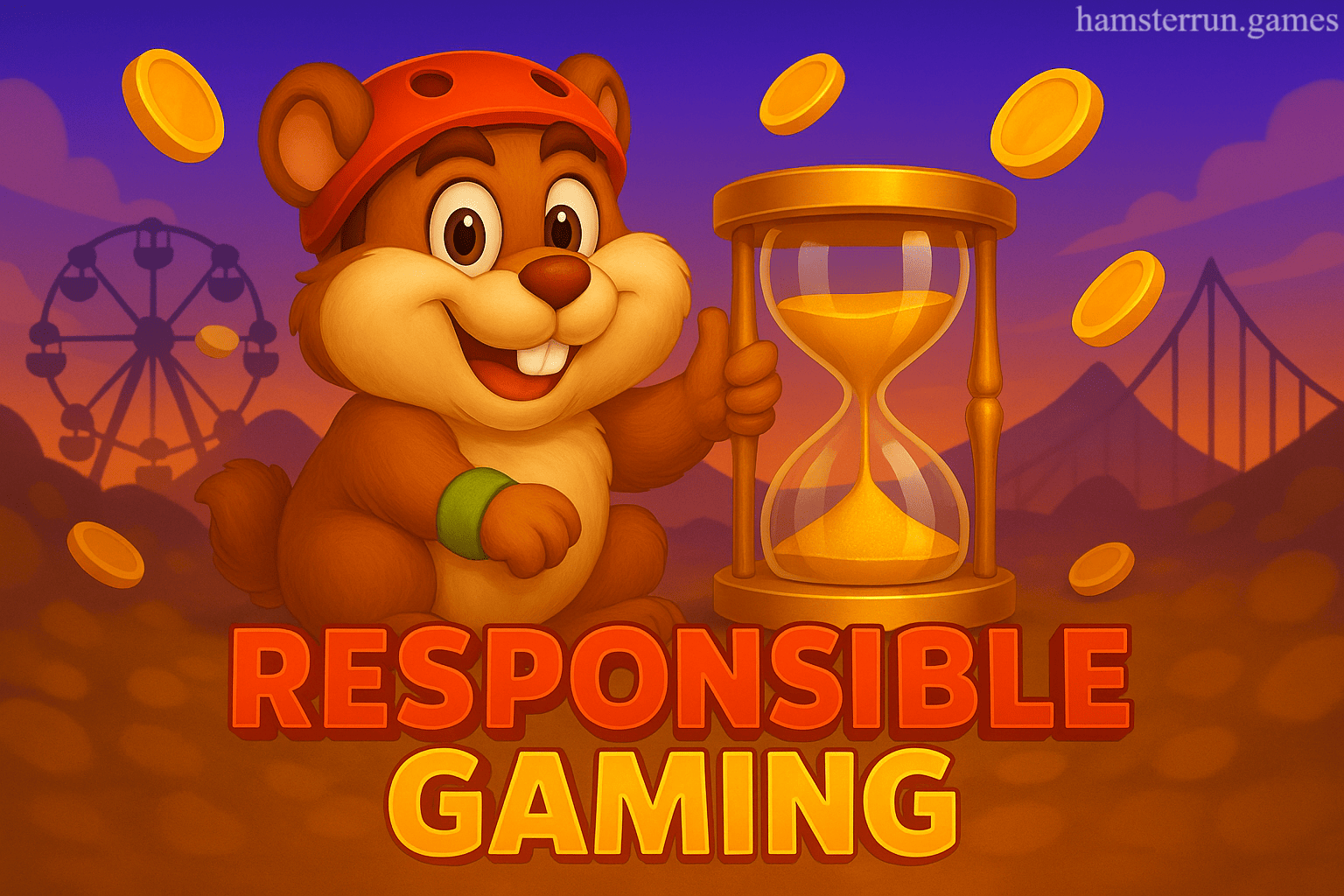Hamster Run is fast and fun, but even simple games can turn into routines we don’t notice. Playing smart means enjoying the game without it spilling into other parts of your life.
We believe staying in control is part of what makes gaming enjoyable. This page shares a few ideas, tools, and reminders that can help you keep your time in the game balanced, intentional, and positive — on your terms.
What Responsible Gaming Means to Us

For us, responsible gaming isn’t about rules or restrictions — it’s about design choices that respect your time and attention. A good game should feel rewarding to play and easy to step away from.
At hamsterrun.games, we think of responsible gaming as a shared mindset: players stay aware of their habits, and we build in ways that don’t exploit them. It’s not just about avoiding harm — it’s about protecting what makes the experience fun in the first place.
Know Your Habits
Gaming is part of your routine — like scrolling, watching, or messaging. That’s why it’s easy to lose track of how often or why you’re playing. Checking in with yourself now and then helps you spot when things are starting to feel off. It’s not about overanalyzing. It’s about knowing how your habits fit your life.
Signs You Might Need a Break
Not sure if it’s time to pause? Here are a few things to look out for:
- You’re playing longer than you meant to — more than once
- You feel tense, irritable, or frustrated when you lose
- You’ve skipped sleep, meals, or other plans to keep playing
- You keep thinking about the game even when you’re not playing
Noticing one or two of these now and then is normal. But if they keep repeating, it might be time to take a step back.
How We Keep the Experience Fair
Fairness in game design means more than just balanced mechanics — it means avoiding tricks that push players to spend more time or money than they want to. Our goal is to keep the experience simple, skill-based, and free from pressure. You should always feel like you’re in control — not like the game is nudging you to keep going.
Design Principles
We follow a few clear rules when it comes to how the game is built and presented:
| 🎮 Element | ✅ Our Approach |
| 🧭 Game flow | No hidden timers, forced loops, or sudden difficulty spikes. |
| 💸 Monetization | No required purchases. Spending is optional and non-intrusive. |
| 🎁 Rewards | Clear, skill-based progress — no manipulative surprise mechanics. |
These choices are intentional. We want the game to feel fair, predictable, and fun — not addictive by design.
Tools You Can Use
Structure helps. The more you shape how and when you play, the easier it is to stay in control — without needing to force it every time. There are tools built into most devices that make this easier, and small habits that can support a healthier rhythm. You don’t need to overhaul your routine — just guide it a bit.
Available Options
These simple tools can help you set boundaries and keep playtime from creeping into other parts of your day:
- Set app time limits in your phone’s settings
- Turn off notifications or set “do not disturb” during breaks
- Schedule a reminder after 20–30 minutes of play
- Plan specific times for full-day breaks
They’re small, but they work best when used regularly — not just when things start to feel off.
Building Healthy Routines
Tech tools help, but habits matter too. Making a few clear decisions about how you play goes a long way:
- Choose start and stop times before you open the game
- Avoid playing when you’re tired, bored, or stressed
- Take 5–10 minute breaks after longer sessions
- Ask yourself: “Do I want to play now, or am I just used to it?”
Being intentional doesn’t make the game less fun — it makes it easier to enjoy without second-guessing yourself later.
When Gaming Becomes a Problem
Most of the time, games are just games — something you do to relax, focus, or pass a few minutes. But like anything enjoyable, it’s possible to lean on it too hard. When play starts feeling like something you can’t stop, or when it regularly gets in the way of your responsibilities, it may be time to talk to someone or take a longer pause. That’s not failure — that’s awareness.
How to Get Help
If you’re feeling stuck, support is available — quietly, respectfully, and without judgment. These organizations offer confidential advice and tools to help get things back in balance:
| 🆘 Resource | 🌍 Region |
| Gamblers Anonymous | Global, with local chapters in many countries |
| BeGambleAware | United Kingdom |
| NCPG (National Council on Problem Gambling) | United States |
| Local mental health services | Available through your country’s support networks |
Reaching out doesn’t mean something’s wrong with you. It means you’re ready to take care of yourself.
For Friends and Families
Sometimes, it’s not you who’s stuck in a pattern — it’s someone you care about. When a game starts taking up too much of their time, energy, or attention, it can be hard to know how to help without pushing them away. Support starts with patience and presence, not pressure. Even small conversations can open the door to change.
What You Can Do
Here are a few ways to offer support if you’re concerned:
- Start a calm, honest conversation — not a confrontation
- Suggest breaks or non-gaming activities you can do together
- Help them notice patterns without judgment
- Encourage them to set limits, or to talk to someone if they feel stuck
You don’t have to fix everything. Sometimes being there is the most important thing.
Final Reminder
You’re in control of how, when, and why you play — and that’s what makes the experience fun. Responsible gaming isn’t about restrictions. It’s about protecting your time, your focus, and your well-being.
Play because you want to, not because you feel like you have to. Take breaks. Pay attention. And enjoy the game on your own terms.




